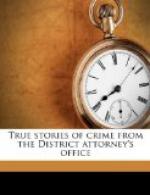But Levitan, who had seen many wolves in sheep’s clothing, and had something of the Sherlock Holmes in his composition, determined to seek the advice of the District Attorney, and having done so, received instructions to go ahead and consummate the purchase of the property. He, therefore, informed Browne that he had learned that the latter was not the owner of record, to which Browne replied that that was true, but that the property really did belong to him in fact, being recorded in Hubert’s name merely as a matter of convenience (because Hubert was unmarried), and that, moreover, he, Browne, had an unrecorded deed from Hubert to himself, which he would produce, or would introduce Hubert to Levitan and let him execute a deed direct. Levitan assented to the latter proposition, and the fourteenth of December, 1905, was fixed as the date for the delivery of the deeds and the payment for the property.
At two o’clock in the afternoon of that day Browne appeared at Levitan’s office (where a detective was already in attendance) and stated that he had been unable to procure Mr. Hubert’s personal presence, but had received from him deeds, duly executed, to the property. These he offered to Levitan. At this moment the detective stepped forward, took possession of the papers, and invited the lawyer to accompany him to the District Attorney’s office. To this Browne offered no opposition, and the party adjourned to the Criminal Courts Building, where Mr. John W. Hart, an Assistant District Attorney, accused him of having obtained money from Levitan by means of false pretences as to the ownership of the property, and requested from him an explanation. Browne replied without hesitation that he could not understand why this charge should be made against him; that he had, in fact, received the deeds from Mr. Hubert only a short time before he had delivered them to Levitan; that Mr. Hubert was in New York; that he was the owner of the property, and that no fraud of any sort had been attempted or intended.
Mr. Hart now examined the supposed deeds and found that the signatures to them, as well as the signatures to a certain affidavit of title, which set forth that William R. Hubert was a person of substance, had all been executed before a notary, Ella F. Braman, on that very day. He therefore sent at once for Mrs. Braman who, upon her arrival, immediately and without hesitation, positively identified the defendant, H. Huffman Browne, as the person who had executed the papers before her an hour or so before. The case on its face seemed clear enough. Browne had apparently deliberately forged William R. Hubert’s name, and it did not even seem necessary that Mr. Hubert should be summoned as a witness, since the property was recorded in his name, and Browne himself had stated that Hubert was then actually in New York.




